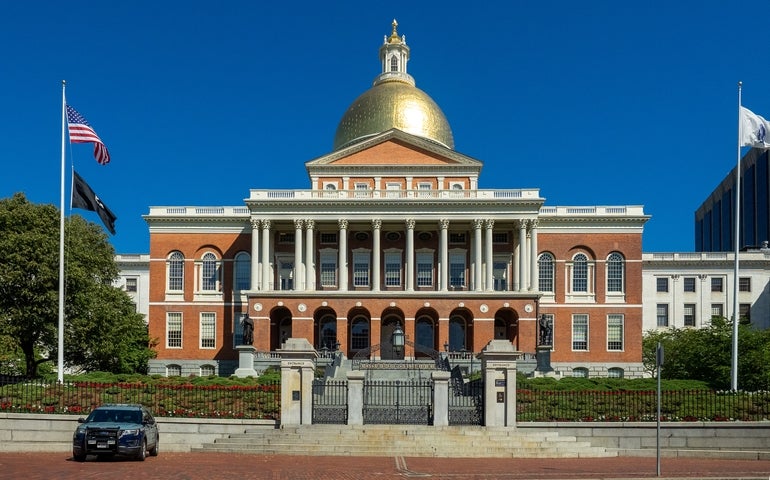Fed guidance appears holdup on UI rate relief quest
 Photo | Flickr | Ajay Suresh
The Massachusetts State House
Photo | Flickr | Ajay Suresh
The Massachusetts State House
A little over a month after Gov. Charlie Baker signed a law shoring up the unemployment system and reducing the premium increases facing employers to fund jobless benefits, lawmakers and administration officials are once again looking for a way to provide businesses relief from spiking costs.
The law Baker signed on April 1 authorized $7 billion in borrowing to stabilize the state's unemployment insurance trust fund, strained by a flood of joblessness during the COVID-19 pandemic, and limited the average rate hike to 18.5 percent instead of the nearly 60 percent increase employers would otherwise have to pay.
Some businesses soon found they were nonetheless facing dramatic increases in their unemployment tax payments, as one component of their UI costs, known as the solvency assessments, jumped from a rate of 0.58 percent in 2020 to 9.23 percent in 2021, surprising many.
Mike Doheny, the undersecretary of labor and general counsel at the Executive Office of Labor and Economic Development, told participants in a virtual Small Business Day event Wednesday that he could not yet offer definitive answers but that the administration was "looking to be able to propose a solution to this very, very shortly."
"I want everyone to know that the administration is working on this issue - the rate notices that went out earlier - is aware of course of the hardship that it's caused so many businesses, and we really are looking for a way to find some relief for not all only small businesses but frankly all businesses in the commonwealth," Doheny said.
Last month, the Department of Unemployment Assistance notified employers that the due date for their first quarter UI payments would be pushed back from April 30 to June 1, saying the administration was "evaluating the solvency rate increase and will provide more information at a later date."
Speaking at the same virtual event as Doheny, Senate Minority Leader Bruce Tarr said state officials are aware that "the clock is ticking" as June inches closer.
"In my opinion, it would be better to solve this problem in advance before those bills are due rather than have folks have to pay them and then have us have to figure out a system of maybe rebating a payment that was in excess of what ultimately it needs to be," the Gloucester Republican said. "We're trying to accelerate this effort as much as we possibly can."
One complicating factor, Tarr said, is that while the state stands to receive billions of dollars in federal aid through the American Rescue Plan Act, detailed guidance on how that money can be spent is not expected until mid-May.
"You can understand that there's hesitance to necessarily commit funds from that act in advance to the issue of addressing the solvency assessment," he said. "Notwithstanding that, there are a number of us that continue to press for that very thing to be the case."
Tarr and House Minority Leader Brad Jones in April sent a letter to Baker, House Speaker Ronald Mariano and Senate President Karen Spilka, urging them to use ARPA money or other federal dollars to replenish the UI trust fund and alleviate the assessment rate sticker shock facing businesses.
Fifty-five lawmakers, Democrats and Republicans from both the House and Senate, signed onto that letter, Tarr said. He said he hears regularly from colleagues looking to take some sort of action on the issue, and that any forthcoming fix would likely "be a standalone kind of approach" rather than contained in the state budget.
The Small Business Day event, which included panels on both Tuesday and Wednesday, was hosted by groups including the National Federation of Independent Business, the Retailers Association of Massachusetts, the Massachusetts Restaurant Association and local chambers of commerce.
Jon Hurst of the Retailers Association told participants that many of the factors that contributed to the multibillion-dollar deficit forecast for the unemployment fund over the next few years were not the fault of business owners -- he pointed to the benefit levels and qualification standards in Massachusetts, government-mandated closures, and fraudulent unemployment claims -- and said that there "needs to be a shared responsibility with government."
"You need to tell them that every dollar you have to expend in UI taxes, unfair UI taxes, is another dollar in wage growth that is not going to happen," he said.
Speakers noted that the higher costs associated with the solvency assessment land as the state is planning for a fuller economic reopening, with an Aug. 1 date penciled in for a complete lift of remaining business restrictions.
Bob Luz of the Massachusetts Restaurant Association said Massachusetts is behind many other northeastern states in the reopening process. Baker has said the Aug. 1 date could be moved up depending on the progress in public health data, and Luz said "we need to hold them to it."
NFIB state director Christopher Carlozzi said an earlier full reopening would be particularly important to seasonal businesses and regions like Cape Cod that rely on summertime activity.
"Under this current scenario, we'll lose two good summer months if we don't do something, if we don't move quicker in Massachusetts," he said.
Carlozzi added, "It's very important we keep pace with our neighbors, to not lose that revenue to our New Hampshires and our Connecticuts and Rhode Islands. They have beaches, too."








0 Comments